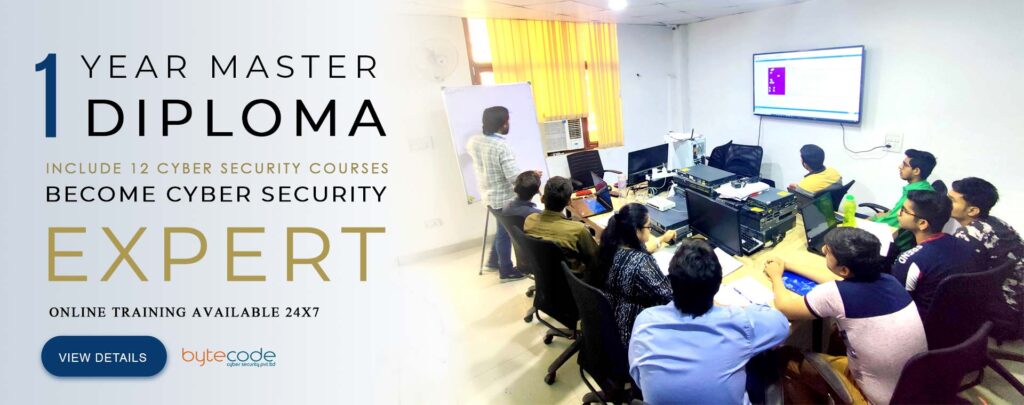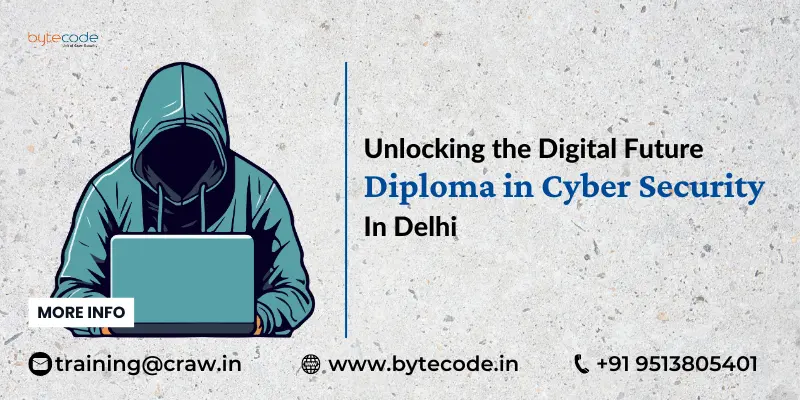Diploma in Cyber Security After 10th in Delhi
The Diploma in Cyber Security will help IT Aspirants learn cyber security skills & knowledge to protect confidential data, networks, servers, and systems from unauthorized access by adversaries. Online hackers are always hyperactive and have the chance to penetrate someone’s security infrastructure.
After that, they can easily steal our sensitive information without letting us know. Do you want to become a professional in cyber security to protect your own and your family’s confidential information against online threats? Then this article is the best fit for you. Without wasting any more time, let’s get straight to the topic!
Introduction: Diploma in Cyber Security After 10th in Delhi
If you also have completed your 10th standard studies, and want to make a career in cybersecurity from the very beginning, you can join a cybersecurity diploma program that is available in the IT Industry with the help of institutes.
One of the most reputed educational organizations, “Bytecode Security” has taken the oath to educate every potential student to the highest standards of cybersecurity domain technical and practical knowledge. We offer the best cyber security training and certification course, “1 Year Diploma in Cyber Security Course.”
This course consists of various amazing cyber security topics such as the following
- Networking,
- Computer Forensics,
- Penetration Testing,
- Encryption, and
- Many More.
The Rise Of Cybersecurity: Why It Matters?
To defend against cyberattacks, promote economic expansion, guarantee data privacy, and uphold national security, cybersecurity is rapidly expanding in India. A significant emphasis on cybersecurity becomes essential for sustained success and resilience in the face of changing cyber risks as India continues to embrace digitalization.
India must advance its cybersecurity for several reasons:
- Digital Transformation: With India’s economy rapidly digitalizing and its reliance on technology growing across multiple industries, including finance, healthcare, and government, strong cybersecurity measures are necessary. Ensuring the success and security of these projects requires the protection of digital assets and sensitive data.
- Cyber Threat Landscape: A wide variety of cyber threats, such as ransomware attacks, data breaches, and financial fraud, are becoming more prevalent in India. The development of cybersecurity is essential to thwarting these dangers and protecting people and companies from potentially disastrous outcomes.
- Economic Impact: Economic stability and expansion are contingent upon a secure digital environment. Cybersecurity measures shield companies from monetary losses, theft of intellectual property, and operational disruptions. This in turn promotes an atmosphere that is favorable for investment and innovation, enhancing the country’s overall economic prosperity.
- Protection of Personal Data: As personal data becomes more digitally connected, cybersecurity becomes essential to protecting people’s privacy and confidentiality. Robust cybersecurity procedures are necessary to shield private information from misuse and illegal access.
- Global Interconnectedness: Due to its involvement in the international economy, India must have a robust cybersecurity posture. Ensuring the security of digital communications and data is crucial for upholding trust and credibility in the international arena as organizations and individuals participate in international transactions and partnerships.
- National Security Concerns: National security and cybersecurity are intimately related. Maintaining the nation’s security and sovereignty depends on defending sensitive government data, defense systems, and vital infrastructure against cyberattacks.
- Emerging Technologies: New cybersecurity concerns are brought forth by using emerging technologies like cloud computing, IoT, and artificial intelligence. Developing a strong cybersecurity framework is necessary to maximize the advantages of new technologies while reducing the dangers that come with them.
- Job Opportunities and Skill Development: In India, the growth of cybersecurity offers a plethora of work prospects. The nation can create a competent labor force that can meet the rising demand for cybersecurity specialists both domestically and internationally by investing in cybersecurity education and training.
The Proliferation of Cyber Threats: The Global Cyber Threats Landscape
- The sophistication of Attacks: Globally, threat actors are using increasingly sophisticated methods to target people, businesses, and governments through ransomware, zero-day exploits, and polymorphic malware.
- Nation-State Cyber Warfare: A growth in nation-state-sponsored cyberattacks that involve espionage, the destruction of vital infrastructure, and intellectual property theft characterizes the situation and raises serious geopolitical and security issues.
- Supply Chain Vulnerabilities: Global supply chains are interconnected, which creates vulnerabilities. Cybercriminals can penetrate huge networks and disrupt services by taking advantage of weak links in the supply chain, which affects industries all over the world.
- Ransomware Proliferation: Attacks using ransomware have increased, mostly affecting essential infrastructure, businesses, and healthcare facilities. Attackers employ increasingly complex strategies and demand larger ransoms, severely impairing businesses’ ability to operate and make money.
- IoT and Industrial Control System (ICS) Threats: Cyber threats that target smart devices, critical infrastructure, and manufacturing processes have increased as a result of the development of Industrial Control Systems (ICS) and Internet of Things (IoT) devices, which have enlarged the attack surface.
- Social Engineering and Phishing: Cybercriminals frequently use social engineering techniques, such as phishing assaults, to take advantage of weaknesses in people. Deceptive strategies are still being used for data theft and unlawful access, such as posing as reliable organizations.
- Emergence of Insider Threats: Insider dangers are increasing, whether they are deliberate or unintentional. Robust security procedures and staff awareness initiatives are important due to the enormous risk posed by malicious insiders who possess sensitive information.
- Cyber Espionage and Intellectual Property Theft: Cyber espionage is the practice of nation-states and cybercriminals stealing sensitive data, trade secrets, and intellectual property, which affects innovation and global economic competitiveness.
- Cybersecurity Skill Shortage: Organizations are left open to attacks due to the global shortage of qualified cybersecurity personnel, which exacerbates the state of cyber threats. Closing this gap is essential to developing strong defenses against changing threats.
- Cross-Border Collaboration: To effectively tackle the global cyber threats panorama, governments, law enforcement agencies, and cybersecurity specialists must collaborate internationally and share information, as cyber dangers have no national boundaries.
The Importance of Early Education in Cybersecurity
- Building a Strong Foundation
The foundation for comprehending digital environments and hazards is laid by early cybersecurity education. A foundation for appropriate digital behavior is laid early on by introducing ideas such as password management, internet safety, and fundamental security precautions.
- Cultivating Critical Thinking Skills
Education in cybersecurity promotes the growth of analytical and problem-solving abilities. Early education develops a mindset that is essential for navigating the intricate and ever-evolving field of cybersecurity by educating pupils to assess potential dangers, recognize vulnerabilities, and come up with solutions.
- Addressing the Skills Gap
The need for cybersecurity experts is growing, and closing the skills gap requires early education. Early exposure to cybersecurity principles aids in developing a pool of competent workers who can contribute to the workforce in the future.
- Empowering Digital Citizens
People who receive early cybersecurity instruction are better equipped to behave responsibly online. People may navigate the digital environment safely and contribute to a more resilient and safe online community by being aware of potential risks and the ramifications of their activities.
- Promoting Lifelong Learning
The field of cybersecurity is dynamic and demands lifelong learning. Early education fosters a culture of lifelong learning by motivating people to continue learning throughout their academic and professional careers by keeping them informed about new developments in technology, threats, and best practices.
- Enhancing Overall Security
A more secure digital environment results from early cybersecurity education for the populace. People who understand the fundamentals of cybersecurity are less likely to become targets of cyberattacks, which eventually improves overall digital security.
- Gaining a competitive edge
People who learn cybersecurity early on have an advantage over others as technology gets more and more integrated into many businesses. Their comprehension and application of security measures turn into a valued skill set that employers in a variety of industries seek.
- Real-world skill acquisition
Early cybersecurity education equips students with immediately usable, real-world skills. Students can apply their theoretical knowledge to real-world situations by learning how to secure personal devices and comprehending the fundamentals of coding and encryption, which will equip them for the challenges of the digital age.
- Opening doors to future opportunities
Many employment options are made possible by early cybersecurity education. Professionals in cybersecurity professions are in greater demand due to the increase in cyber threats. People with a background in this area can pursue a variety of career paths, such as cybersecurity consulting or ethical hacking, which opens up a lot of chances for them in the future.
What to Expect from a Cybersecurity Diploma Course?
- Hands-on training and lab
Practical instruction and lab exercises are usually included in a cybersecurity diploma program. To improve their capacity to apply theoretical information in actual situations, students can anticipate gaining hands-on experience in fields including penetration testing, network security, and incident response.
- Career Opportunities After Completion
Obtaining a cybersecurity diploma opens you with several job options. Graduates can work as network security specialists, cybersecurity analysts, or ethical hackers. The diploma boosts employment in the quickly expanding field of cybersecurity and serves as a significant credential.
- Entry-level cybersecurity roles
Students enrolled in these diploma programs are frequently prepared for entry-level cybersecurity jobs. Graduates can land jobs as security administrators or junior cybersecurity analysts, which gives them a solid base on which to build their knowledge and abilities.
- The Potential for Career Growth
Having a cybersecurity diploma paves the way for job advancement beyond entry-level roles. A career path for ongoing professional development is provided by the ability to progress to positions like cybersecurity consultant and security architect with experience and additional certifications, or even to specialize in specialized fields like cloud security.
- Assessing Your Aptitude and Interest
A cybersecurity diploma program aids students in determining their aptitude and area of interest. Using exposure to diverse cybersecurity domains, individuals can discern particular areas of interest, establishing the foundation for specialization and targeted career pathways that are congruent with their aptitudes and fervor.
- Future Considerations
Diploma programs frequently change as the cybersecurity industry does, taking new dangers and technologies into account. Graduating students should keep up with industry developments and think about pursuing further training and certifications to be competitive in the ever-changing cybersecurity market and maintain their relevance and efficacy in the workplace.
Frequently Asked Questions
About Diploma in Cyber Security After 10th
1. Can I pursue this diploma after completing my 10th grade?
Yes, if you get in contact with Bytecode Security, then that is possible. That’s because this course’s least prerequisite on the premises of Bytecode Security is 10th passed with 5.0 CGP.
2. Does cybersecurity require math?
Although it’s not a must, having a basic understanding of arithmetic can be helpful in cybersecurity for activities like data analysis and cryptography. For one to succeed in the sector, practical abilities, critical thinking, and an understanding of cybersecurity ideas are frequently more important.
3. Which diploma is best for cyber security?
One of the most reputed institutes, “Bytecode Security” is offering a “1 Year Diploma in Cyber Security Course.” This course is specially designed to offer you the best introduction to the fundamentals of cybersecurity techniques and the use of tools. What are you waiting for? Contact, Now!
4. Is a diploma in cyber security worth it?
In India, obtaining a diploma in cybersecurity might be beneficial since it offers hands-on training, industry-relevant information, and improved employability in a field that is expanding quickly and needs qualified workers. However, individual tastes and career ambitions should also be considered when assessing the diploma’s value.
5. How long is the diploma in cyber security?
This depends on the training and certification provider that is offering the diploma for cyber security. Bytecode Security is offering the “1 Year Diploma in Cyber Security Course” with a duration of 720 Hours. What are you waiting for? Contact, Now!
6. Is learning cyber security hard?
Because cybersecurity is so sophisticated and requires constant adaptability to changing threats, learning it can be difficult. Nonetheless, people can successfully acquire the required skills with commitment, practical experience, and a planned learning path.
7. Do I need to take any exams to get certified after the diploma?
Yes, after getting trained by joining the “1 Year Diploma in Cyber Security Course” on the premises of Bytecode Security you will need to crack the examination to get the certificate validating your knowledge & skills. To learn more about it in detail, contact us now!
8. Can I do cybersecurity without a degree?
Indeed, you may work as a cybersecurity professional in India without a formal degree. Since practical skills, certifications, and real-world experience are highly valued in cybersecurity professions, self-learning, and certification pathways are respectable substitutes for a traditional degree.
Conclusion
Want to work with professionals? Then you are at the right place. Get in contact with Bytecode Security which offers one of the best courses for learning cybersecurity and that is the “1 Year Diploma in Cyber Security Course.”
After joining this course, one will be able to get trained under the guidance of a professional cybersecurity expert in the best learning environment. Moreover, one can test their honed skills on the demo machines in the virtual labs offered by Craw Security. What are you waiting for? Contact, Now!



